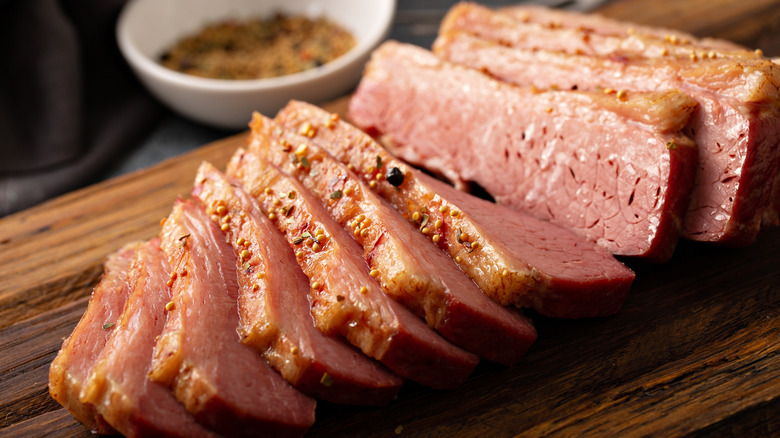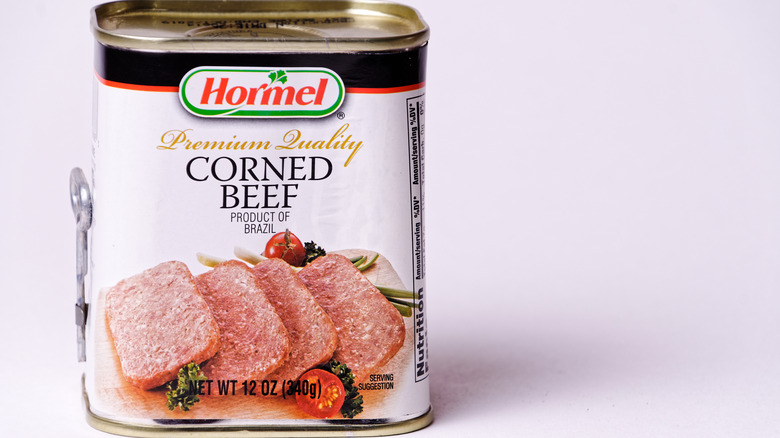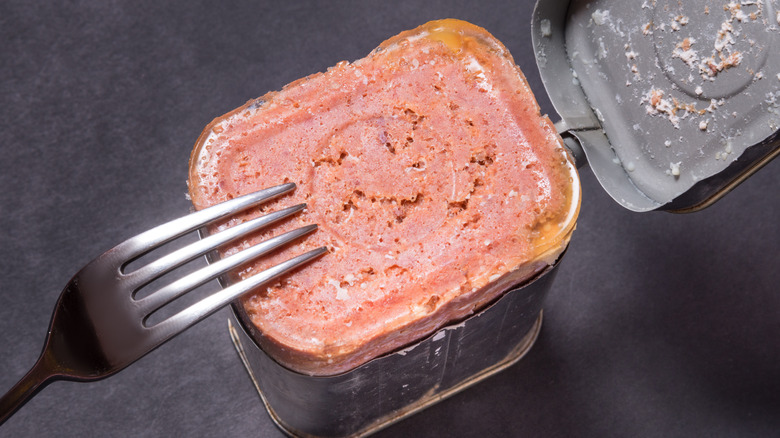Here's Why Canned Corned Beef Comes In A Rectangular Can
If you've been in a diner before, chances are you've probably seen something on the menu called a corned beef sandwich. Maybe one of your older relatives has a love for the stuff, or maybe you've heard of people eating lots of corned beef on St. Patrick's Day. Just what exactly is the deal with this beef?
Before we go any further into divining the mysteries of corned beef, let's get one thing clear: There's absolutely no corn in corned beef. As Food & Wine explains, the term "corned beef" was coined by the English back in the seventeenth century, who were referring to the large "kernels" of salt used to preserve beef (apparently, you had to be there to get the joke). The supposedly Irish dish also isn't actually Irish in nature at all, according to Smithsonian Magazine. Corned beef only gained its reputation in Ireland thanks to the prohibition of exporting live cattle to England in the 1600s and, considering Ireland had plenty of cattle it mainly used for farming (and not for eating), the English began to rely on Irish cows for corned beef. When Irish immigrants came to America, they could only afford cheap meats, such as corned beef, thus leading to the connection between Ireland and corned beef we have today.
Okay, so if corned beef isn't made with corn and it's not really Irish, what other mysteries are hidden in this salty and tender slab of beef, and why does it come crammed into those dinky little rectangular tin cans?
Corned beef tins look like that for practical reasons
Corned beef always seems to come in these little square-looking cans. When you open one, a perfectly solid block of meat falls out on your plate in all of its pink, quivering glory. But why is corned beef packaged like this to begin with? There are actually many legitimate reasons for this canned meat's unique design, ranging from ensuring the proper shape of the meat to wartime transport.
According to FoodHow, corned beef cans have their odd shape because they were originally designed to be military rations. The compact shape of the cans allowed for many containers of beef to be stored at once. Another helpful design component was that the cans had (and still have) their own "key" that unlocks the top, allowing soldiers to quickly open and eat their meal without the need for any extra tools like can openers (unless, of course, they were to lose the key). As corned beef became more popular, grocery stores adopted the cans for the same reason the military did: storage purposes. Since the cans were rectangular and compact, that meant they could be stored on shelves much more easily and in greater numbers.
That's not all: The Guardian explains that, thanks to the can's shape, the block of corned beef inside can easily be taken out without it breaking apart. With the corned beef brick still in one piece, you can easily cut it and serve it instead of scooping out clumps of meat.
Knowing when to toss your can of corned beef
Corned beef may come in a can, but that doesn't mean that it's going to be good forever. Like other canned goods, corned beef can go bad over time and it's advised to look out for these warning signs to keep yourself from getting sick from it.
According to StillTasty, while canned corned beef can last a few years under the right conditions, the signs that canned corned beef has gone bad include an "off" color or smell, with mold appearing in extreme cases. If the can of corned beef isn't open, but is dented or seems to be damaged in any way, it's suggested that you immediately throw it out as the beef may be contaminated with botulism, a disease found within canned goods (via CDC). If you notice that your corned beef has a sort of white film on top, don't worry! This is a natural part of the corned beef and doesn't mean your meat is spoiled.
With all this in mind, how can you keep your corned beef as fresh as possible for as long as possible? The USDA explains that, should you have corned beef that is removed from the can, it's suggested to drain and wrap the corn beef block and freeze it for up to one month. If the corned beef is already cooked, then it's recommended that it be refrigerated for 3-4 days or frozen for one to two months before it goes bad.


